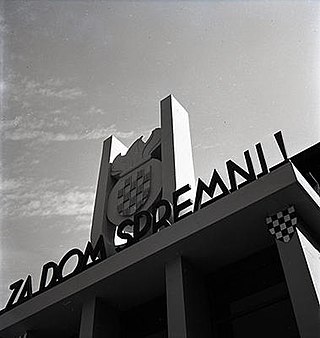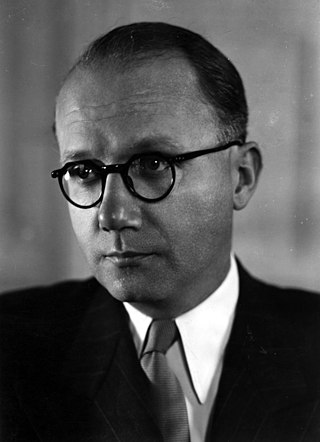
The Independent State of Croatia was a World War II-era puppet state of Nazi Germany and Fascist Italy. It was established in parts of occupied Yugoslavia on 10 April 1941, after the invasion by the Axis powers. Its territory consisted of most of modern-day Croatia and Bosnia and Herzegovina, as well as some parts of modern-day Serbia and Slovenia, but also excluded many Croat-populated areas in Dalmatia, Istria, and Međimurje regions.

Koprivnica is a city in Northern Croatia, located 70 kilometers northeast of Zagreb. It is the capital and the largest city of the Koprivnica-Križevci county. In 2011, the city's administrative area of 90.94 km2 had a total population of 30,854, with 23,955 in the city proper.

Bjelovar is a city in central Croatia. It is the administrative centre of Bjelovar-Bilogora County. At the 2021 census, there were 36,433 inhabitants, of whom 93.06% were Croats.

The Catholic Church in Croatia is part of the worldwide Catholic Church that is under the spiritual leadership of the Pope. The Latin Church in Croatia is administered by the Croatian Bishops' Conference centered in Zagreb, and it comprises five archdioceses, 13 dioceses and one military ordinariate. Cardinal Josip Bozanić is the Archbishop of Zagreb.

The Croatian Home Guard was the land army part of the armed forces of the Independent State of Croatia which existed during World War II.

Slavko Kvaternik was a Croatian Ustaše military general and politician who was one of the founders of the Ustaše movement. Kvaternik was military commander and Minister of Domobranstvo. On 10 April 1941, he declared the creation of the Independent State of Croatia.

The Croatia national handball team represents Croatia in international men's team handball competitions and friendly matches. The handball team is controlled by the Croatian Handball Federation (HRS).

Za dom spremni! was a salute used during World War II by the Croatian Ustaše movement. It was the Ustaše equivalent of the fascist or Nazi salute Sieg Heil.
Operation Labrador was a false flag operation carried out by the Yugoslav Air Force's Counterintelligence Service (KOS) in the Croatian capital city of Zagreb during the early stages of the Croatian War of Independence. It was devised as a series of terrorist attacks intended to create an image of Croatia as a pro-fascist state. Two bombings were carried out on 19 August 1991, with one at the Jewish Community Centre and a second near Jewish graves at the Mirogoj Cemetery; there were no casualties. Additional attacks targeted the national railway network and were designed to implicate the Croatian President. Operation Labrador was complemented by Operation Opera — a propaganda campaign devised by the KOS to feed disinformation to the media.
The Croatian Committee was a Croatian revolutionary organization, formed in the Summer of 1919, by émigré groups in Austria and Hungary, in opposition to the creation of the Kingdom of Serbs, Croats and Slovenes (Yugoslavia) and devoted to Croatia's secession from the kingdom. The Croatian Committee and its armed branch the Croatian Legion were dissolved in 1920, some of its members later joined the fascist Ustasha organization.
During World War II the Independent State of Croatia awarded a number of orders, decorations and medals.

Josip Jurčević is a Croatian historian and politician.

A telephone exchange, telephone switch, or central office is a telecommunications system used in the public switched telephone network (PSTN) or in large enterprises. It interconnects telephone subscriber lines or virtual circuits of digital systems to establish telephone calls between subscribers.

Ante Vokić was a Croatian politician, general and putschist. Member of the Ustaše, he was the Minister of Armed Forces of the Independent State of Croatia from 29 January to 30 August 1944, succeeding Miroslav Navratil.
The Ustaše Militia was the military branch of the Ustaše, established by the fascist regime of Ante Pavelić in the Independent State of Croatia (NDH), an Axis puppet state established from a large part of occupied Yugoslavia during World War II.

Vladimir Košak was a Croatian economist, lawyer, politician and NDH diplomat, hanged for war crimes after World War II.

The General Post Office in Jurišićeva Street, Zagreb, is the headquarters of the Croatian Post, the national postal service of Croatia. Built in 1904 in the Hungarian Secession style, the Post Office housed mail, parcel, telegraph and telephone services and equipment. Today, it is a protected cultural monument.

When World War II started, Zagreb was the capital of the newly formed autonomous Banovina of Croatia within the Kingdom of Yugoslavia, which remained neutral in the first years of the war. After the Invasion of Yugoslavia by Germany and Italy on 6 April 1941, German troops entered Zagreb on 10 April. On the same day, Slavko Kvaternik, a prominent member of the Ustaše movement, proclaimed the creation of the Independent State of Croatia (NDH), an Axis puppet state, with Zagreb as its capital. Ante Pavelić was proclaimed Poglavnik of the NDH and Zagreb became the center of the Main Ustaša Headquarters, the Government of the NDH, and other political and military institutions, as well as the police and intelligence services.

The Croatian Partisans, officially the National Liberation Movement in Croatia, were part of the anti-fascist National Liberational Movement in the Axis-occupied Yugoslavia which was the most effective anti-Nazi resistance movement led by Yugoslav revolutionary communists during the Second World War. NOP was under the leadership of the League of Communists of Yugoslavia (KPJ) and supported by many others, with Croatian Peasant Party members contributing to it significantly. NOP units were able to temporarily or permanently liberate large parts of Croatia from occupying forces. Based on the NOP, the Federal Republic of Croatia, which was referred to by Winston Churchill as "the Croatian miracle" was founded as a constituent of the Democratic Federal Yugoslavia.

Konak kod Hilmije is a Bosnian television comedy series created and written by Feđa Isović and directed by Elmir Jukić.

















